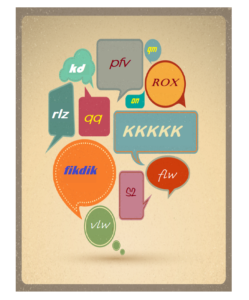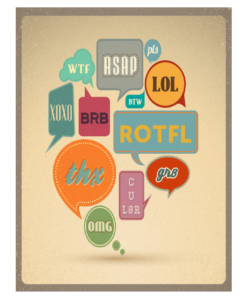
27 Jul A New Challenge: Sight Translating Texts and Social Media
This is a new aspect of what we do in court interpreting. When Facebook and Instagram and even text messaging were new around here, not many of the folks I interpreted for on a daily basis were fans. In fact, it wasn’t until recently that I started to notice a surge of non-English social media messages and texts being presented as evidence in court, especially as part of informal hearings. The challenge of personal messages is taken to the next level with abbreviated text, quick quips, rapid-fire exchanges, and selfies to boot.
 Dealing with this can be difficult, depending on who presents the evidence and under what circumstances. When I work on a case where the party introducing the evidence is represented, there is at least some hope that the message in question will have its proper translation all neatly prepared ahead of time. This is the more formal hearing type. In less formal hearings where parties appear without representation, the offending Facebook post or text message is often brought up last minute on somebody’s cellphone. I’m then expected to quickly understand the abbreviations, undertones, and context since informal hearings are often about immediate issues of safety and potential loss of freedoms. Surely I’m not the only one who has noticed how difficult it can be to accurately render such language and
Dealing with this can be difficult, depending on who presents the evidence and under what circumstances. When I work on a case where the party introducing the evidence is represented, there is at least some hope that the message in question will have its proper translation all neatly prepared ahead of time. This is the more formal hearing type. In less formal hearings where parties appear without representation, the offending Facebook post or text message is often brought up last minute on somebody’s cellphone. I’m then expected to quickly understand the abbreviations, undertones, and context since informal hearings are often about immediate issues of safety and potential loss of freedoms. Surely I’m not the only one who has noticed how difficult it can be to accurately render such language and  meaning into everyday English.
meaning into everyday English.
What do our ethics say about sight translation in general? We are told to take the time to read and understand, and to ask for a break or recess if we need to look things up. Such a request is probably expected with documents that have some degree of length or formality, but even a short series of messages interspersed with sarcasm, insults, disguised threats, and the lot, often reach far beyond our ability to meet the perceived expectation to quickly begin sight translating.
I have never seen an entry in a training manual that deals with how to handle double meanings, misspellings, shorthand, and sarcasm in a text message or as part of a status update. I’m sure our judicial officers would appreciate the time savings if we could jump right in without missing a beat when a teeny-tiny text message needs to be rendered into English, but in order to truly capture meaning we may need to go back a few messages just to get the context.
This new trend raises a lot of questions that are truly worth taking pause to ponder: If we are asked to just sight translate just one message out of many in a thread, is there a nice, succinct way to explain our need for more context? How should we stop between messages to note the change in speaker? Is it considered proper to hold the phone ourselves? How to best call attention to the informal nature of abbreviations or common misspellings, if at all? Are there suggestions we could make to a judicial officer about better conditions for an accurate performance? How flexible should we be and where do we draw the line to prevent ourselves from becoming advocates?
Now that’s something worth discussing. What say you?
__________
TNO Editor: An update for you to enjoy: https://www.ted.com/talks/john_mcwhorter_txtng_is_killing_language_jk?utm_campaign=tedspread&utm_medium=referral&utm_source=tedcomshare
 Jennifer De La Cruz first became interested in learning Spanish in her college years, earning a Bachelor’s Degree in Spanish with an emphasis in linguistics from California State University at Fullerton. While interpreting and translating for the healthcare field, she earned certifications as a Court Interpreter for both the California and Federal Courts, later accepting a staff position with the California Trial Courts. Her passion for the Spanish language has become a thriving and satisfying career both in the fields of interpreting and translation, while her professional posts have allowed her to specialize in the highly challenging fields of law and medicine.
Jennifer De La Cruz first became interested in learning Spanish in her college years, earning a Bachelor’s Degree in Spanish with an emphasis in linguistics from California State University at Fullerton. While interpreting and translating for the healthcare field, she earned certifications as a Court Interpreter for both the California and Federal Courts, later accepting a staff position with the California Trial Courts. Her passion for the Spanish language has become a thriving and satisfying career both in the fields of interpreting and translation, while her professional posts have allowed her to specialize in the highly challenging fields of law and medicine.

What a fine post! I don’t have a smart phone. I have never written nor received a text message. Imagine my concern when asked to sight translate a veiled and highly idiomatic text in Spanish, (Spanglish, really) my second language, This was in a hostile custody case here in Albany. It probably helped me that I had to be shown how to operate the phone, having never done so. This gained me sympathy. Fortunately the judge, with whom I have a good relationship, only wanted to hear threats violating an order of protection. Those stood out reasonably clearly and the rest of it was of no interest to her. Had the entire text been relevant, I’d have been good and truly lost.
To me it’s clear that this post can be the beginning of an immensely useful discussion, hopefully resulting in publication. This challenge can only become more complex and demanding as tech becomes more deeply entrenched in our culture.
There is a subset to this topic. Many years ago I had an assignment to monitor wire taps in a Federal drug case. Interwoven into the conversations were highly sophisticated and disguised code. As I was only listening for certain names, I didn’t have to worry about that. How would someone handle that in a text in a trial?
I’m sure that was quite the relief! And I’m quite surprised that you’ve *never* received or sent a text (and curious as to why?); it being one of the main forms of communication nowadays. I’m also curious if you don’t find that places you “behind the times”?
I have often run into similar issues when working from video messages in sign language and texts that may also incorporate signed “abbreviations” that hold meaning in English. Most often I face the issue when parties are requesting an Order of Protection or may be in violation of an existing Order.
Oftentimes, in my experience, the judge will look directly at the phone and make a determination of the content if the messages are text form. For video messages, I have taken the approach of requiring a formal transcription for anything that will become part of the official court record. By producing a formal transcript of the message, attorneys are able to argue the content and meaning.
In a pinch, I would request a sidebar with the judge to discuss some of the issues and implications of doing a sight translation for the record and allow the judge to decide how they would like it handled so it is out of my hands.
IF the slang is Mexican I have done this and had no problems. If it’s isn’t, please, let me know and MAYBE someone else is from the area. I’d be okay a lot of the time but not always if that were true. This comes up a lot in family law cases and occasionally in dependency cases. I am active in Facebook with family, both here and in Mexico.
Excellent article, Jennifer! Very valid questions and concerns. This is a topic which is relevant to all and merits further thoughts, research and discussion.
Thank you for your valuable insight!
Excellent article, Jennifer. We convince court and counsel that if they have more than a few pages of text messages, they will have to be rendered in writing. Here is an excerpt of a cover sheet used for a text message exchange that was over 1000 (one thousand) text messages long:
The attached translation of text messages was prepared from Spanish into English.
Date and time were included above the pertinent message.
Overlapping messages: Messages that were repeated on the original provided were not translated or reproduced again for clarity’s sake. The current text was marked where the original showed duplications of messages.
Misspelled words were not addressed with (sic!) and were corrected using best judgment for translation purposes.
Lack or excess of diacritical marks and punctuation in the original texts remain the same in the original copied for translation purposes and were taken into account for translation.
This is to certify that the following translation is correct and complete to the best of my knowledge and ability.
Good topic for an article, perhaps with a glossary. Happens to me all the time in restraiing order cases. One funny one in Spanish is “k” = que, which doesn’t EVEN make sense, since that letter is called “kah” not “kay”!
I’m getting too old for the “evolution” of language. I think it’s a travesty. You haven’t lived until you have to get in a twit’s brain to get context out of the nonsense they text all day long. They say the NSA intercepts every communication, and that’s just dandy, but I feel the pain of the staff that has to go through the overloaded trebuchet of utter linguistic garbage between millennials nowadays. Good grief! Imagine looking at this garbage for a living. We have to draw the line, for our profession and our collective sanity. We don’t translate from Moron into Cohesive. Crap In-Crap Out. That’s how I look at it. Uno hace de tripas corazón todos los días con el analfabetismo, tratando de establecer un conducto de comunicación, but this kind of gobbledegook is just ridiculous.
Judge: And now the interpreter will render a sight translation of these texts into Spanish for the witness. Proceed.
As if! OMG and I b like wow and she b all in my face like I’ll cut a biazach yo but she b hatin tripin cause I b woke yo so I prolly b like ama STFU now but she b like yo mama dis and I b like watch it dis b like when boo got shot and I ain’t no adulting today nah yo so I be like brb lol I b scare yo fo realz.
Interpreter: Your honor… WTF?!?!?!
Hahahah, see what I did there? I kill me! I should’ve been a comedian… mo money mo money!